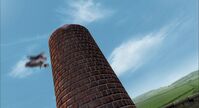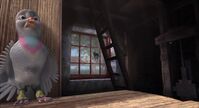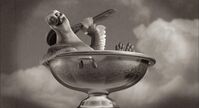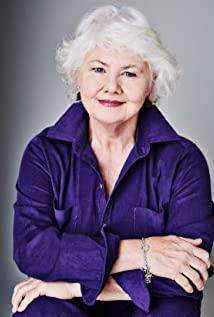Although this film is very relaxing, the background behind it is not so random.
————————————————
I can’t imagine that
one day there will
be only humans left on the earth.
What a terrible thing that would be.
Animals preserve the last nature, innocence, loyalty, friendliness and kindness for us.
Among the many types of medals in the UK, there is such a special medal that no one can get it, because it is a Deakin medal set up specifically for animals. The Deacon Medal, more popularly known as the "Animal VC" (VC stands for Victoria Cross), was established by Miss Maria Deacon. The medal is awarded to animals that showed extraordinary courage and dedication in performing their duties during and after World War II. Of the 52 Dickon Medals awarded, 18 were awarded to dogs, 3 to horses, 1 to a cat, and 31 to pigeons.
And the cat named Simon was able to receive this honor because in 1949, when the Royal Navy of the British Empire was engaged in a fierce battle with the Chinese army over a political incident, the kitten was causing the incident. "Quartz" (HMS Amethyst).
I don’t want to comment on the battle, I just want to reprint the part about the cat:
Just when the battle started, Simon—a male cat with green eyes and black and white fur—was sleeping in the captain’s cabin. . When the ship's cabin was hit by a bomb, the explosive air flow lifted him up and fell to the ground fiercely. Simon was in a coma in the aisle covered with shrapnel and ruins.
In this mutual slaughter of humans, Simon was lucky enough to be picked up and hidden in the bottom of the cabin. Its beard and eye hair were burned out, and the remaining hair was stained with dust and blood, and its entire left leg was covered with deep scars scratched by shrapnel from its back to the entire left leg. The bullet fragments from its wounds were carefully taken out and received the most comfortable care, although no one thought it would survive that night.
However, Simon miraculously woke up. It was resurrected on the night when it was about to be added to the list of deaths. Although the injury is very serious, its wound has really started to heal, but it will not be able to fully heal overnight. After the bombing and destruction, rats began to raging on the battleship, and the little food left and even the sleeping soldiers were attacked by rats.
Negotiations with the Communist Army on allowing the withdrawal of warships faced unhelpful delays at this time because China asked the British army to admit that it was the "Emisist" that fired first—the British refused to admit it several times because of this. The request is obviously contrary to the facts. The days on the warship became more and more sultry, humid, and irritating. When the crew of the ship tried to fall asleep in the increasingly suffocating heat, the rats began to bite their toes little by little. So when Simon caught a big mouse for the first time, it was an incredible boost to the morale of the ship.
Since then, Simon has acted mercilessly towards mice, and the lives of his comrades have become much more comfortable. In addition, there is a hound named Pudge on the battleship. The existence of Simon and Pudge (they seem to get along at least) seems to be a booster, so that the soldiers can always feel the joy of the long-lost family life, even though they know themselves. Maybe I can never go home again.
Finally, on the night of July 30, 1949, the "Emisist" began to break through under the cover of night. Later, after experiencing a series of dangerous situations, they were shot by the Communists on the shore. The British army finally broke through and entered the high seas when the hull was further destroyed.
After 101 days and nights of ordeal, this is finally over. King George VI of the United Kingdom sent a congratulatory message and ordered the award of titles to the heroes. Simon was immediately recommended for his brave and outstanding performance in wartime, and was awarded the Deacon Medal by the National Disabled Animal Rescue Center. This medal is specially set up for animals serving in the police, national defense or armed forces. So far Simon is not only the only cat to be awarded this medal, but also the only animal to receive this honor in the Royal Navy. The crew first put a chic bow tie on the colored medal ribbon for Simon to wear, and he will be awarded the real medal when he returns to England.
On December 1, the "Emisist" sailed into Port Prems, and they were greeted with a grand welcome ceremony. When the soldiers were immersed in the joy of reuniting with relatives and friends, Simon was sent to the Animal Quarantine Center in Saare for quarantine. On December 28, Simon died. Congenital heart failure, combined with old injuries on his body, and constant fighting with those oversized rats, all of this eventually took his life.
A few days later, Simon’s body was carefully wrapped in cotton, placed in a tiny coffin decorated with the Union Jack, and buried in cemetery No. 281 of PDSA Pet Cemetery in Isaacs Elft. Was given absolute naval honor.
In 1950, American writer Paul Glick wrote a short speech in his novel "Fanny": "Only dedicated to the late Simon of the Emisist".
————————————————
About the incident:
In early April 1949, the Second and Third Field Army of the Chinese People's Liberation Army assembled on the north bank of the Yangtze River from Jiujiang in the west and Jiangyin in the east. If the Nanjing government refuses to sign the domestic peace agreement drawn up in the Peking negotiations. The million-strong division will immediately cross the Yangtze River and destroy the Kuomintang’s Yangtze River defense line. April 20 is the deadline for the signing of the peace talks between the Central Committee of the Communist Party of China and the Kuomintang authorities. On the 21st, the People's Liberation Army will cross the river. That morning, the "Amethyst" flying the British flag travelled westward from the lower reaches to the surface of the water near Sanjiangying, Jiangdu County, Jiangsu. Stationed in this area is the Third Regiment of the Sanye Special Artillery Corps. The People's Liberation Army fired artillery warnings, but the British ships continued to advance and aimed their naval guns at the North Shore. The 3rd Artillery Regiment fired, and the Amethyst fired back. During the artillery battle, the "Amethyst" command podium was shot and stranded on the river near Zhenjiang. After hearing the news, Lieutenant General Maiden, the deputy commander-in-chief of the British Far East Fleet (Admiral Blount, commander-in-chief in London), ordered the warship "Mate" moored on the Nanjing River to rescue. Shanghai. Maiden personally led the flagship of the Far East Fleet, the 10,000-ton heavy cruiser "London" and the frigate "Black Swan" to rescue from Shanghai, and traveled to the river surface of the port in Taixing County, Jiangsu Province on the morning of the 21st.
In the early morning of the 21st, the Central Route Army had already crossed the natural dangers of the Yangtze River in Wuhu, Anqing. The afternoon of the 21st was the crossing time of the Tenth Corps. Twenty-third Army Commander Tao Yong asked if Ye Fei, commander of the Tenth Corps, fired at the British ships. Ye Fei considered that the Tenth Corps was about to set off and ordered the forward post to raise a signal to warn it to leave quickly, otherwise it would fire bombardment away.
After receiving the order, the Sixth Regiment of the 23rd Artillery Artillery issued a warning to the British ships. But the British ship did not respond. Ye Fei ordered the cannon to fire. The Artillery Sixth Regiment and the artillery deployed on the coastal positions all joined the artillery battle. The "London" podium was hit during the artillery battle, but it continued to move westward. When approaching the "Amethyst", they were violently bombarded by a group of artillery. The "London" and "Black Swan" could not get close to the "Amethyst" and had to return to Shanghai. In this incident, 45 people were killed in the British Navy, including the "Amethyst" Captain Skinler, one missing and 93 injured. The 23rd Army also suffered considerable casualties. In the artillery battle, there were 252 casualties, including Deng Ruobo, commander of the 202 regiment.
When the "Amethyst" incident occurred, the Central Committee of the Communist Party of China did not know, nor did it issue instructions to fire on British ships. Knowing the news that the "London" came to rescue, the Central Committee believed that the British ship did not intend to collude with the Kuomintang to prevent the People's Liberation Army from crossing the river. This was completely accidental. On the 22nd, the General Front Committee instructed the "London" to be rescued. However, after learning that there was a new artillery battle between the "London" and the "Black Swan" and the People's Liberation Army, and the People's Liberation Army had 252 casualties, the attitude of the Central Committee changed.
On the 30th, Li Tao, the spokesperson of the Chinese People’s Liberation Army Headquarters, issued a statement, solemnly protesting against such interference and atrocities by British warships, and demanding that the British government admit its mistakes and compensate. Foreign armed forces such as warships, military aircraft, and marines quickly withdrew from China The territorial waters, territorial waters, and airspace of China.” A Sino-British diplomatic dispute caused by the "Amethyst" incident has suddenly become the focus of international public opinion.
In fact, the British government in 1949 took a wait-and-see attitude towards the situation in China. The defeat of the Kuomintang government forced the British government to reconsider its China policy. After the Kuomintang government moved south to Guangzhou in February 1949, the British Embassy in China did not move with it, but stayed in Nanjing, waiting for political stability.
Negotiations:
Why did the British government send warships to and from the Yangtze River at this time?
In order to rescue the embassy and the citizens of the Commonwealth countries in the event of an emergency, after obtaining the consent of the Kuomintang government, in November 1948, the British ambassador to China Ralph Swinson asked the British Far East Fleet to send a warship to berth near Nanjing. water surface. The warships are rotated once a month. The British ship anchored in Nanjing on the eve of the People's Liberation Army crossing the river was the "Mate".
This behavior of Rafo Sdvinson was quite risky. When the Kuomintang was defeated and the People's Liberation Army crossed the river was a foregone conclusion, he sent warships to anchor on the Yangtze River without obtaining the consent of the Liberated Area regime where the military power on the north bank of the Yangtze River was overwhelmingly dominant. Water surface, this is an extremely unwise move. The US government at this time has already withdrawn the warships anchored in Nanjing. Moreover, Raffo Sdvenson did not inform the government of such an important matter in advance. On the day of the "Amethyst" incident, the British government called its embassy in China to ask why the "Amethyst" was sent to Nanjing at this time, and expressed its dissatisfaction with Rafo Svenson.
Rafo Sdvinson certainly knew that a large-scale battle was about to take place in the KMT army in the Yangtze River waters. He has vaguely felt a little uneasy. On April 7, he called Maiden, the deputy commander-in-chief of the British Far East Fleet, asking him not to send ships to Nanjing to rotate the Mate at this dangerous time. But Maiden disagreed. It's not that Maiden didn't know the danger on the Yangtze River at this time, but the artillery of the People's Liberation Army was just millet and rifle in his eyes. On the 16th, Maiden decided to still send the "Amethyst" to Nanjing and filed a sailing application with the Kuomintang government. The indecisive Rafo Svenson agreed to Maiden's plan on the 18th. At 8 o'clock in the morning on the 19th, the "Amethyst" sailed from Shanghai to Nanjing. After the "Amethyst" ran aground, Maiden sent a warship to rescue, but it was unsuccessful. The conflict was in danger of escalation. At this time, Rafo Swinburne and Maiden realized the thorny issue of the incident.
The news soon reached London, and the ruling and opposition parties were in an uproar, and they were extremely dissatisfied with the Labor Party Attlee government. Many parliamentarians pointed out that at such an extremely sensitive moment, it is a risky behavior for a warship to park on the water of the Yangtze River where the two armies are facing each other. In 1943, the Sino-British New Testament abolished the navigation rights of British warships in China's inland rivers. The provocative navigation of British ships on the eve of the People's Liberation Army crossing the river would obviously arouse the anger of the People's Liberation Army. Churchill, the former prime minister, criticized the Labour Party government for its inadequate understanding of the situation in China, which put the British sailors in a dangerous situation. Even at the emergency meeting on April 20, the cabinet questioned the Far East Fleet’s dispatch of warships to the embassy to deliver peace supplies, believing that the British ships should obtain guarantees of safe passage from both the Kuomintang and the Communist Party before entering the Yangtze River.
The Conservative Party asked the government to retaliate against the People's Liberation Army, but the government adopted a calm and restrained attitude and insisted on negotiating a solution. According to Maiden's more objective report, the British government determined that the incident was not intentional by the high level of the Chinese Communist Party. It was completely accidental. Therefore, the British government did not even raise any protests. But the British side did not feel that they had violated China's sovereignty because they believed that they had obtained the consent of the Kuomintang government. In response to a member’s question on whether the government will apologize to the CCP in order to save the lives of British people, Attlee made it clear that there is no possibility of making any apologies.
China has also taken note of the British reaction and made special regulations for frontline troops to fire on foreign warships, requiring troops not to fire on foreign warships without central orders. The Central Military Commission has also determined the policy of solving the problem through negotiation-as long as the British side admits that "it is not allowed to enter the People's Liberation Army defensive area without our permission, and to collude with the Kuomintang warships and the South Bank Army to attack our army."
In view of the shortage of the trapped "Amethyst" officers and soldiers, the British side is very anxious and hopes to have direct talks with the high level of the Chinese Communist Party as soon as possible. However, because the two sides do not have diplomatic relations, China does not recognize the status of British diplomats. The British side contacted the PLA's high-level officials through various channels, but they were all unsuccessful. The Chinese side defined this incident as a local issue and insisted on the settlement by the frontline military commanders of the two sides through consultation. Kang Maozhao, political commissar of the Eighth Corps Artillery 3rd Regiment in Zhenjiang, was appointed as the Chinese negotiator. But the British side is reluctant to engage in low-level negotiations. Blunt wrote to Yuan Zhongxian, the highest official in the Zhenjiang area of the People's Liberation Army and political commissar of the Eighth Corps, hoping to conduct high-level diplomatic negotiations, but to no avail.
The Central Committee of the Communist Party of China, which holds the initiative, is unwilling to get into endless disputes over this incident. The Central Military Commission made a concession and decided to separate the issues of admitting mistakes, apologizing, and compensating from the issue of repairing the Amethyst. On June 20, Yuan Zhongxian met with the British negotiator, assistant to the British military attache to China, and the acting captain of the "Amethyst" Krens, and informed the British of China's attitude. Krens noticed that when referring to the Amethyst, the Chinese side did not use the word "intrusion", but the word "intrusion without authorization." Krens and Raffo Stevenson were very excited. Both Prime Minister Attlee and the Navy Department are ready to accept this compromise. The time to resolve the Amethyst incident seems ripe.
On June 23, the British cabinet discussed this matter. However, the cabinet did not come to a conclusion after the dispute, but only authorized Foreign Secretary Hall to make a decision after consultation with Secretary of the Navy Bevin. After studying, Hall and Bevin basically reached an agreement, that is, try to get the Chinese representative to agree to use "unfortunate entry." As a bottom line, you can accept "unauthorized break-in", try not to abort the agreement, and call Blunt about this. But when Blunt was late to tell Krens the bottom line, it was already a bit late. In the new round of negotiations on July 5, according to the decision of the central government, the Chinese representative, Kang Maozhao, insisted that the British side must write "unauthorized" and "invaded China's inland river" in the exchange of text and clearly admitted "basic mistakes."
The British cabinet firmly opposed this, and it was a "fundamental mistake" not to admit that the "Amethyst" and other ships along the river were a "fundamental mistake." Bevin only admitted that it was a "misunderstanding." The British government even considered submitting the matter to the United Nations for discussion. The cabinet tended to replace Krens with Blunt and talk directly with General Yuan Zhongxian. Blunt is also willing to go out in person, with Krens as the messenger. However, because the positions of the two sides are far apart, the negotiations have reached a deadlock.
Withdrawal
As the negotiations were ineffective, the withdrawal became an issue that Blunt began to consider. In late July, there will be a major typhoon in Nanjing, Shanghai and Hangzhou. Blunt believes this is an excellent time to retreat. On the one hand, he asked Krens to negotiate with the Chinese representative as a cover, on the other hand, he actively prepared for the retreat. On July 29, Blunt informed the Admiralty of this decision. However, both the Navy and the Ministry of Foreign Affairs expressed opposition. The Ministry of Foreign Affairs believes that such risky actions will benefit Britain in the future of Red China, and may even have a serious impact on the lives of British people.
In fact, the CCP has acquiesced to the withdrawal of the "Amethyst". In the absence of an acknowledgment and apology from the British government, the Central Committee of the Communist Party of China was unwilling to expend too much energy, and issued an order for the "Amethyst" only known to the senior commanders of the People's Liberation Army. After the incident issued a statement condemning the "secret order." However, China believes that if Britain adopts a threat of force, it must not allow the Amethyst to leave. The Central Committee of the Communist Party of China later ordered that if the British ship received the "Amethyst" or the "Amethyst" and left without authorization, it would give a firm blow, but not to sink the "Amethyst" when hitting it.
On the night of July 30, without the permission of the British government and without prior consultation with Blunt and Rafo Svenson, the acting captain of the "Amethyst" Krens temporarily decided to rate the ship based on an unexpectedly favorable opportunity. abscond. The "Amethyst" forcibly approached the China Jiangling Jiefang passenger ship, which was just passing the Zhenjiang water at this time, as a cover. When the People's Liberation Army fired artillery to warn it to stop sailing, the "Amethyst" brazenly fired its artillery and collided with many wooden ships and escaped from the Yangtze River. The British Foreign Office is extremely dissatisfied with the "Amethyst" operating without government approval. But Blunt is determined to take responsibility for Krens. Under Blunt’s efforts, the British Admiralty issued a statement stating that the escape was "authorized by the commander-in-chief of the Far East Fleet." After the "Amethyst" escaped, the Chinese side responded calmly. In addition to condemning it, there was no further reaction. It did not mention the statement of the British Foreign Office after the "Amethyst" escaped, "It is still preparing to make proper preparations." Discuss the issue of responsibility for the April incident at the level." A high-profile international dispute ended with the escape of the British ship.
Strictly speaking, there was something wrong with the shelling of British ships such as the "Amethyst". After all, the British warships did not declare war on the People's Liberation Army. Although we do not recognize the treaty signed by the Nanjing government, the safest way is still to use diplomatic channels first to court and then to fight. After the gun battle with the British ships, a certain officer of our army said: "What's wrong with firing the gun first? That's it! The Yangtze River belongs to China, so why did the British warships get in? The British guys get out of China!" It is said that Chiang Kai-shek got it. After knowing this, he pondered for a long time and said: "The *** who started the revolution is bold!"
——————————————————————
Other news about the Deacon Medal:
Animal Hero Monument to be repaired
The British Mark Six Fund donated 50,000 pounds to repair the animal tombstones that made outstanding contributions in World War II.
The funds will be donated to PDSA, a British animal charity organization, to renovate a special animal cemetery owned by the organization.
This animal cemetery is located in Ilford, Essex, where the animals that contributed to the Allied forces in World War II are buried. Among them is a hen named "Mary".
During World War II, "Mary" flew between France and Britain many times to deliver top-secret information to the Allied forces. In 1942, there was an enemy bombing, "Mary" was wounded, but she flew with the wounds and completed the mission. After the war, "Mary" was awarded the highest honor in the animal kingdom for her bravery and fearlessness-Dicken Medal (Dicken Medal), its status is equivalent to the highest honor in the British army-Victoria Cross (Victoria Cross).
Next to the tomb of the dove "Mary" is the tomb of the cat "Simon".
In this animal hero cemetery, there is also a tomb of a dog named "Lipp". "Leip" was originally a stray dog living in the Poplar area of East London, but was later taken by a charity. In 1940, London was bombed. "Lipp" found many injured people in the rubble and saved their lives.
Let us remember these animals.
View more about Valiant reviews











